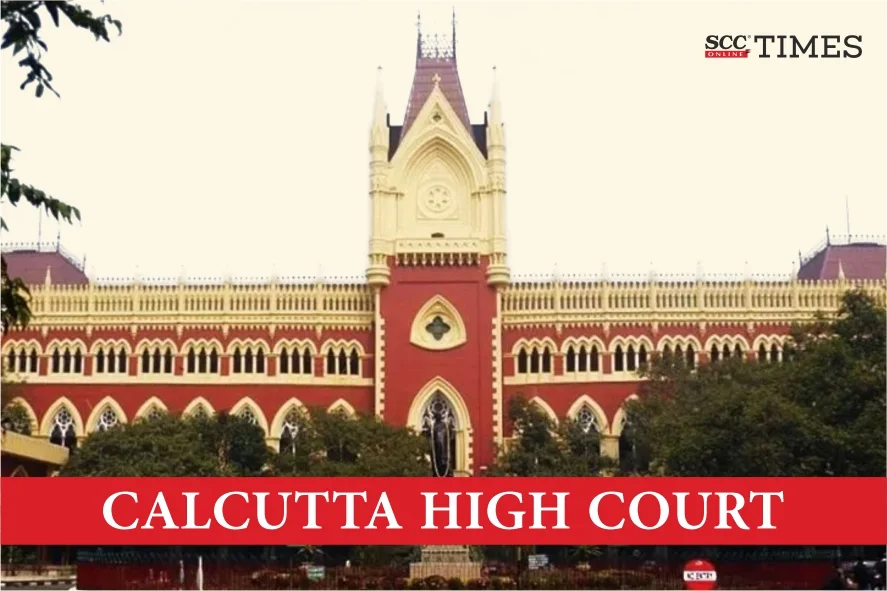Calcutta High Court: A death reference and an appeal was filed challenging the judgement dated 29-09-2023 and order of conviction dated 30-09-2023 as passed by Sessions Judge out of a sessions case whereby the said Court found the present appellant guilty of the charge under Section 302 Penal Code, 1860 (IPC) for the commission of murder of “Dharampita” and “Dharammata” of their adopted son (complainant), thus sentencing him to suffer capital punishment of death by hanging him by his neck till his death with fine of Rs. 1 lakh and to suffer R.I. for five years. A division bench of Soumen Sen and Partha Sarathi Sen, JJ., authored separate judgment wherein both judges had differences in opinion. Justice Soumen Sen set aside the death penalty and ordered conviction for 30 years, whereas Justice Partha Sarathi Sen ordered acquittal of the death row convict.
A written complaint was filed at Kalimpong Police Station, reporting the deaths of his ‘dharampita’ and ‘dharmamata’ in their home. He learned of their deaths from another person and found them deceased upon arriving at their residence, suspecting foul play by unknown perpetrators. Following the complaint under Section 302 IPC for murder, the investigation culminated in a charge sheet against the appellant, who subsequently denied the charges during the trial. The prosecution presented 20 witnesses and various documents to support their case, while the defence primarily focused on denying the allegations and claiming false implications. The trial concluded with the appellant’s conviction and subsequent filing of the instant appeal and death reference challenging the judgment.
The Court authored two different opinions:
Judgment Authored by Justice Partha Sarathi Sen:
The prosecution claimed recovery of a murder weapon and jewelry from Pradhan’s residence, supported by testimonies and exhibits. However, the Court found critical procedural lapses, witnesses were not present during the recovery, a requirement under judicial standards, and the appellant’s statement failed to sufficiently detail the items’ exact concealment spots. This lack of procedural adherence and substantive evidence undermined the credibility of the recovery process, casting doubt on its validity.
Regarding the identification of jewelry allegedly belonging to the deceased, witnesses’ testimonies did not conclusively establish ownership. Despite assertions from witnesses, including family members of the victims, the Court noted discrepancies and insufficient substantiation of claims, weakening the prosecution’s narrative. Additionally, forensic evidence concerning the alleged murder weapon, a knife with human blood of AB group lacked crucial verification. The prosecution failed to produce the Senior Scientific Officer who conducted the blood analysis, crucial for confirming a match with the victims’ blood. This failure further diminished the prosecution’s ability to substantiate the charges against the accused.
The case also involved electronic evidence in the form of Call Detail Records (CDRs) and a certificate under Section 65B of the Evidence Act. The prosecution sought to establish communication between the accused and a witness before the crime, but the defence successfully argued against the admissibility of these records. They highlighted procedural inadequacies in obtaining and presenting electronic evidence, including lack of proper certification under Section 65B. The Court ruled that these pieces of evidence were inadmissible, thereby weakening the prosecution’s case.
Thus, the Court concluded that the prosecution before the Trial Court has miserably failed to establish the circumstances from which an absolute inference of guilt of the present appellant can be drawn. There are so many lacunae in the chain of circumstances leading to the alleged guilt of the accused. Since the conclusion of a criminal trial is based on the theory of conclusive proof and not on preponderance of probability, the Court held that the Trial Court is not justified in coming to a finding that the charge under Section 302 IPC has been proved as against the present appellant beyond reasonable doubt. Thus, the instant appeal was allowed, and death reference was answered in negative.
Therefore, the Court sets aside the impugned judgement dated 29-09-2023 and order of conviction dated 30-09-2023 as passed by Sessions Judge and acquitted the appellant as he was not found guilty under Section 302 IPC for the commission of murder.
Judgment Authored by Justice Soumen Sen:
The Court emphasized the importance of evaluating the probability of reforming and rehabilitating the accused before imposing the death penalty. This approach necessitates looking beyond the crime itself to consider the potential for the criminal’s reformation. The Court referenced multiple precedents to underline the necessity of such an inquiry. The Courts are mandated to conduct a rigorous analysis, gathering evidence about the convict’s behavior in jail, mental state, family connections, and other relevant factors to determine if reformation is possible.
The Court noted that its duty extends beyond merely considering the crime’s severity; it must also evaluate the criminal’s background and potential for reintegration into society. In this case, it was found that the Trial Court had failed to conduct an adequate inquiry into the accused’s potential for reformation and rehabilitation. The reports from the Superintendent and Psychologist of Jalpaiguri Central Correctional Home indicated that the accused had good conduct in jail, no adverse reports, coherent speech, goal-directed behavior, and intellectual insight. Additionally, the accused had no prior criminal record, suggesting a potential for reformation. The Court also noted that the accused was not given sufficient time between conviction and sentencing to present mitigating circumstances.
As a result, the Court decided to set aside the death sentence and commute it to 30 years of imprisonment, stipulating that the accused shall not be released before completing 30 years of actual sentence. Thus, the appeal was allowed in part, and the lower court records were directed to be sent back along with a copy of the judgment.
[Krishna Pradhan v. State of West Bengal, 2024 SCC OnLine Cal 6373, decided on 02-07-2024]
Advocates who appeared in this case :
For the appellant : Mr. Arjun Chowhdury, Adv., Ms. Pratusha Dutta Chowdhury, Adv. Ms. Riya Aggarwal, Adv. For the State : Mr. Aditi Shankar Chakraborty, Ld. APP, Mr. Ujjwal Luksom, Adv., Mr. Subhasish Misra, Adv.







